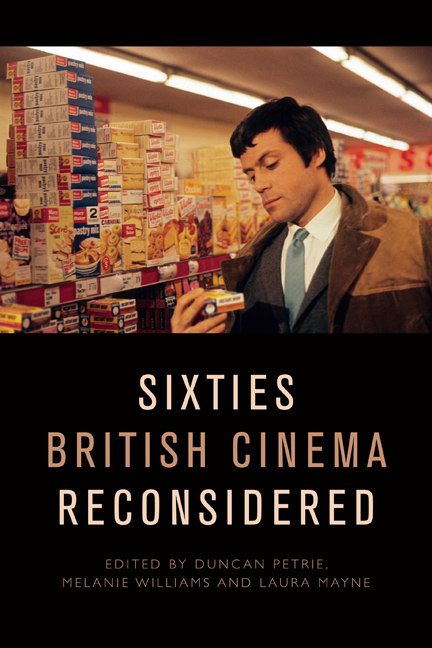Book contents
- Frontmatter
- Contents
- List of Figures and Tables
- Notes on the Contributors
- Introduction
- PART ONE STARS AND STARDOM
- 1 Male Stardom in 1960s British Cinema
- 2 ‘Rebel Rebel’?: Oliver Reed in the 1960s
- 3 Carol White: The Bardot of Battersea
- 4 ‘The Old Wave at Work’: The Transatlantic Stardom of the British Character Actress in the 1960s
- PART TWO CREATIVE COLLABORATIONS
- 5 Woodery-pokery: Charles Wood’s Sixties Screenwriting
- 6 ‘Beyond Naturalism’: Jocelyn Herbert, If . . . (1968) and Design for Performance in 1960s British Cinema
- 7 Kes: From Page to Screen
- 8 ‘I’d like to remember you as you are – as just a grumpy old man’: Joseph Losey and the Making of Figures in a Landscape (1970)
- PART THREE STYLE AND GENRE
- 9 ‘Wholesome rough stuff’: Hammer Films and the ‘A’ and ‘U’ Certificate, 1959–65
- 10 Widescreen Pyrotechnics: Shot Composition and Staging in the Cold War Films of Joseph Losey and Sidney J. Furie
- 11 The Rise and Fall of the Colourful Corporate Fantasy in 1960s British Cinema
- 12 Witchfinders and Sorcerers: Sorcery and Counterculture in the Work of Michael Reeves
- PART FOUR CULTURAL TRANSFORMATIONS
- 13 ‘An Impulse of Anger, Instantly Regretted’: Rebellion and Reaction in the Early-1960s Naval Film
- 14 Narratives of Race and Identity in Sixties British Cinema
- 15 Panic at the Disco: Brainwashing, Alienation and the Discotheque in Swinging London Films
- Index
1 - Male Stardom in 1960s British Cinema
Published online by Cambridge University Press: 22 September 2020
- Frontmatter
- Contents
- List of Figures and Tables
- Notes on the Contributors
- Introduction
- PART ONE STARS AND STARDOM
- 1 Male Stardom in 1960s British Cinema
- 2 ‘Rebel Rebel’?: Oliver Reed in the 1960s
- 3 Carol White: The Bardot of Battersea
- 4 ‘The Old Wave at Work’: The Transatlantic Stardom of the British Character Actress in the 1960s
- PART TWO CREATIVE COLLABORATIONS
- 5 Woodery-pokery: Charles Wood’s Sixties Screenwriting
- 6 ‘Beyond Naturalism’: Jocelyn Herbert, If . . . (1968) and Design for Performance in 1960s British Cinema
- 7 Kes: From Page to Screen
- 8 ‘I’d like to remember you as you are – as just a grumpy old man’: Joseph Losey and the Making of Figures in a Landscape (1970)
- PART THREE STYLE AND GENRE
- 9 ‘Wholesome rough stuff’: Hammer Films and the ‘A’ and ‘U’ Certificate, 1959–65
- 10 Widescreen Pyrotechnics: Shot Composition and Staging in the Cold War Films of Joseph Losey and Sidney J. Furie
- 11 The Rise and Fall of the Colourful Corporate Fantasy in 1960s British Cinema
- 12 Witchfinders and Sorcerers: Sorcery and Counterculture in the Work of Michael Reeves
- PART FOUR CULTURAL TRANSFORMATIONS
- 13 ‘An Impulse of Anger, Instantly Regretted’: Rebellion and Reaction in the Early-1960s Naval Film
- 14 Narratives of Race and Identity in Sixties British Cinema
- 15 Panic at the Disco: Brainwashing, Alienation and the Discotheque in Swinging London Films
- Index
Summary
In 1963, Clive Barnes, a London correspondent for the New York Times, profiled ‘Britain's new actors – rougher, tougher, angrier’, identifying a “‘new wave” of naturalistic players [who] are anti-heroes – on stage and off’ who were undermining the ‘old-school-tie traditions of London's theatrical Establishment’. A ‘new type of Englishman’, rebellious and anti-authoritarian, had emerged, achieving international prominence. The object of Barnes's attention was a group of working-class male actors – Alan Bates, Michael Caine, Sean Connery, Tom Courtenay, Albert Finney, Richard Harris, Peter O’Toole and Terence Stamp – which, at the time and subsequently, actively promoted themselves as a new, uninhibited and irreverent generation. Harris contended that they embodied ‘a fine madness. We weren't afraid to be different. So we were always dangerous; dangerous to meet in the street, in a restaurant, and dangerous to see on stage or in a film’, which, characteristically, conflates on- and off-screen image.
Although at root the product of the 1944 Education Act that provided universal secondary education which afforded working-class children the opportunities denied to their parents’ generation, these actors were shaped by and helped shape two separate but interconnected cultural myths: ‘in the 1950s it was the aggressive ambition of the Angry Young Man; in the 1960s it was Swinging London’. In cinematic terms, it was the British New Wave (1959–63) films that depicted the Angry Young Man, extending the reach of that myth into the early 1960s. By contrast, Swinging London (1963–7) was a more diffuse phenomenon that traded on lifestyle rather than particular cinematic representations. Caine, and especially Stamp, became iconic Swinging London figures, featured in David Bailey's Box of Pin-Ups (May 1965), which incorporated male actors into a wider grouping of pop stars, fashion designers, models and photographers that formed a new classless meritocracy.Although the New Wave films depicted the north and Swinging London the metropolis, both emphasised changing social structures, new opportunities and the rise of the young working class that was not prepared to accept its allotted place.
This chapter analyses in what ways this generation of male stars – there were pronounced differences as well as commonalities – represented these transformations and how they changed perceptions of screen acting, masculinity and stardom. My approach to stardom follows Paul McDonald's lead by emphasising its industrial context, the importance of attending to business practices and stars’ value as capital assets that can be marketed and monetised.
- Type
- Chapter
- Information
- Sixties British Cinema Reconsidered , pp. 11 - 28Publisher: Edinburgh University PressPrint publication year: 2020



